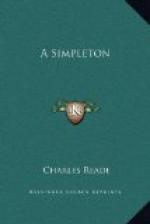“Is that so, Dr. Snell?” asked Lusignan, anxiously.
“It is so, sir.” He added, “The treatment has been submitted to me, and I quite approve it.”
He then asked for a pen and paper, and wrote a prescription. He assured Mr. Lusignan that the case had no extraordinary feature, whatever; he was not to alarm himself. Dr. Snell then drove away, leaving the parent rather puzzled, but, on the whole, much comforted.
And here I must reveal an extraordinary circumstance.
Wyman’s treatment was by drugs.
Dr. Snell’s was by drugs.
Dr. Snell, as you have seen, entirely approved Wyman’s treatment.
His own had nothing in common with it. The Arctic and Antarctic poles are not farther apart than was his prescription from the prescription he thoroughly approved.
Amiable science! In which complete diversity of practice did not interfere with perfect uniformity of opinion.
All this was kept from Dr. Staines, and he was entirely occupied in trying to get a position that might lead to fortune, and satisfy Mr. Lusignan. He called on every friend he had, to inquire where there was an opening. He walked miles and miles in the best quarters of London, looking for an opening; he let it be known in many quarters that he would give a good premium to any physician who was about to retire, and would introduce him to his patients.
No: he could hear of nothing.
Then, after a great struggle with himself, he called upon his uncle, Philip Staines, a retired M.D., to see if he would do anything for him. He left this to the last, for a very good reason: Dr. Philip was an irritable old bachelor, who had assisted most of his married relatives; but, finding no bottom to the well, had turned rusty and crusty, and now was apt to administer kicks instead of checks to all who were near and dear to him. However, Christopher was the old gentleman’s favorite, and was now desperate; so he mustered courage, and went. He was graciously received—warmly, indeed. This gave him great hopes, and he told his tale.
The old bachelor sided with Mr. Lusignan. “What!” said he, “do you want to marry, and propagate pauperism? I thought you had more sense. Confound it all I had just one nephew whose knock at my street-door did not make me tremble; he was a bachelor and a thinker, and came for a friendly chat; the rest are married men, highwaymen, who come to say, ‘Stand and deliver;’ and now even you want to join the giddy throng. Well, don’t ask me to have any hand in it. You are a man of promise; and you might as well hang a millstone round your neck as a wife. Marriage is a greater mistake than ever now; the women dress more and manage worse. I met your cousin Jack the other day, and his wife with seventy pounds on her back; and next door to paupers. No; whilst you are a bachelor, like me, you are my favorite, and down in my will for a lump. Once marry, and you join the noble army of foot-pads, leeches, vultures, paupers, gone coons, and babblers about brats—and I disown you.”




